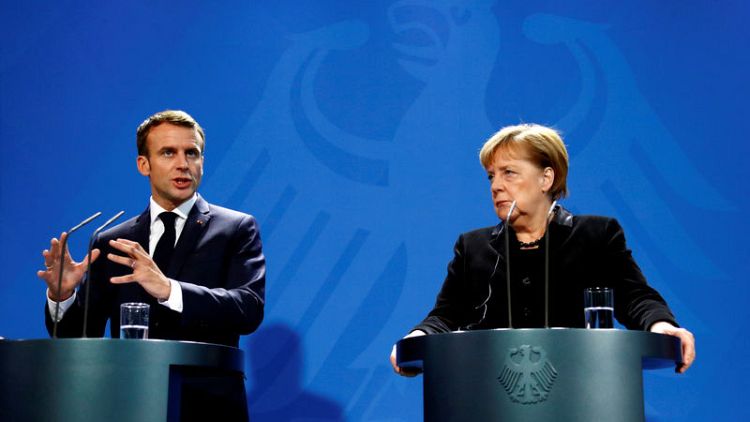BERLIN (Reuters) - German Chancellor Angela Merkel said on Saturday the European Union must deepen cooperation in defence and in particular weapons systems development, warning Germans that they may need to make compromises on strict export controls.
In a bid to counter growing eurosceptic nationalism before elections to the European Parliament in May, Merkel has stressed the importance of close cooperation within the bloc.
On Jan. 22 she signs an agreement with French President Emmanuel Macron that builds on a 1963 treaty of post-war reconciliation and is aimed at bolstering the EU.
In a speech to her conservative Christian Democrats (CDU) in the northern city of Rostock, Merkel said: "It is good that after several decades we want to develop a common defence policy ... We must develop weapons systems together," adding Europe had many more systems than the United States.
Arguing that EU countries should not compete among themselves for new projects and fighter planes but develop products together, she said there would be a need to compromise on export rules.
"We have very strict export rules, others have less strict rules ... But anyone who develops an airplane with us would also like to know whether they can sell the plane with us," she said.
"We will have to make compromises, that is what we are talking about at the moment."
Last year, France stopped short of Germany's move to halt arms sales to Saudi Arabia after the murder of Saudi journalist Jamal Khashoggi.
In her weekly podcast, Merkel stressed the importance of the French-German partnership at the heart of the EU, saying the friendship was "far from a given after centuries of military conflict between our countries".
"We want to give an impulse to European unity," Merkel said.
Although the two countries, traditionally the EU's main engine, differ on issues such as euro zone reform, the treaty envisages deeper cooperation in foreign and defence policy and in tackling terrorism as well as more cultural exchanges.
(Reporting by Madeline Chambers and Andreas Rinke; Editing by Janet Lawrence)
